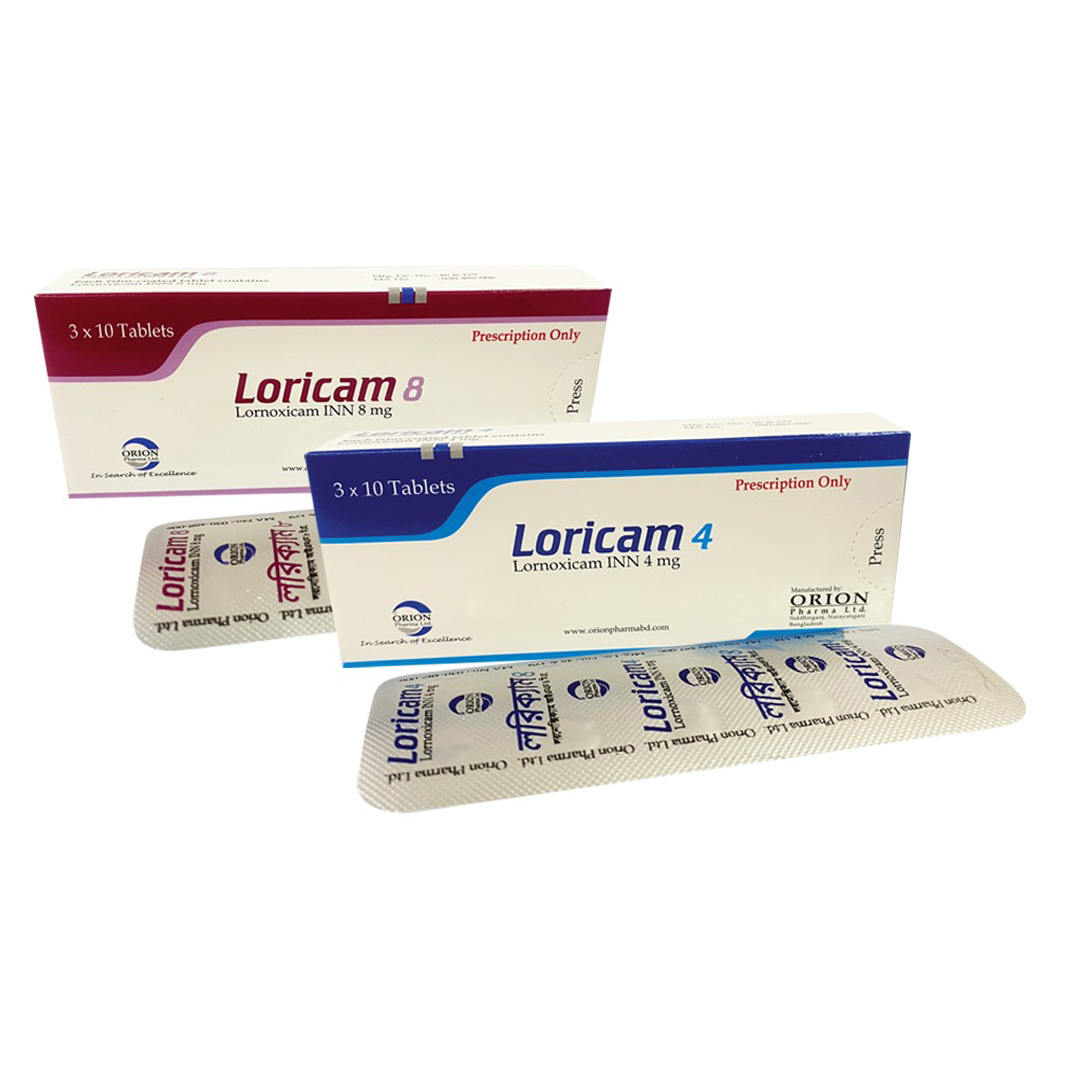Unit Price:
৳ 10.00
(3 x 10: ৳ 300.00)
Strip Price:
৳ 100.00
Also available as:
Indications
Loricam is indicated in-
- Short-term relief of acute mild to moderate pain
- Symptomatic relief of pain inflammation in osteoarthritis
- Symptomatic relief of pain and inflammation in rheumatoid arthritis.
* রেজিস্টার্ড চিকিৎসকের পরামর্শ মোতাবেক ঔষধ সেবন করুন
Pharmacology
Lomoxicam is a non- steroidal anti-inflammatory drug (NSAID) and antirheumatic drug of the oxicam class. It is intended for short term treatment of acute mild to moderate pain and symptoms of rheumatoid arthritis and osteoarthritis such as pain and inflammation of joints. Lornoxicams mode of action is mainly related to the inhibition of the prostaglandin synthesis (inhibition of the cyclooxygenase enzyme) leading to desensitization of peripheral nociceptors and consequently inhibition of inflammation.
Dosage & Administration
Acute Pain: 8-16 mg Lomoxicam daily divided into 2 or 3 doses. Maximum recommended daily dose is 16 mg.
Osteoarthritis and Rheumatoid arthritis: Initial recommended dose is 12 mg Lomoxicam daily divided into 2 or 3 doses. Maintenance dose should not exceed 16 mg Lomoxicam daily.
Use in Children & Adolescents: Lomoxicam is not recommended for use in children and adolescents below age 18 due to lack of data on safety and efficacy.
Elderly: No special dosage modification is required for elderly patients above age 65 but Lomoxicam should be administered with precaution as gastrointestinal adverse effects are less well tolerated in this group.
Renal Impairment: For patients with mild to moderate renal impairment the maximum recommended daily dose is 12 mg divided in 2 or 3 doses.
Hepatic impairment: For patients with moderate hepatic impairment, the maximum recommended daily dose is 12 mg divided in 2 or 3 doses. Undesirable effects may be minimized by using the lowest effective dose for the shortest duration necessary to control symptoms.
Osteoarthritis and Rheumatoid arthritis: Initial recommended dose is 12 mg Lomoxicam daily divided into 2 or 3 doses. Maintenance dose should not exceed 16 mg Lomoxicam daily.
Use in Children & Adolescents: Lomoxicam is not recommended for use in children and adolescents below age 18 due to lack of data on safety and efficacy.
Elderly: No special dosage modification is required for elderly patients above age 65 but Lomoxicam should be administered with precaution as gastrointestinal adverse effects are less well tolerated in this group.
Renal Impairment: For patients with mild to moderate renal impairment the maximum recommended daily dose is 12 mg divided in 2 or 3 doses.
Hepatic impairment: For patients with moderate hepatic impairment, the maximum recommended daily dose is 12 mg divided in 2 or 3 doses. Undesirable effects may be minimized by using the lowest effective dose for the shortest duration necessary to control symptoms.
* রেজিস্টার্ড চিকিৎসকের পরামর্শ মোতাবেক ঔষধ সেবন করুন
Interaction
Concomitant administration of Lomoxicam and combination with Vitamin K antagonists like warfarin increases the risk of bleeding. Combination with Cyclosporin can lead to reduced kidney function and to acute kidney injury in rare cases. Lomoxicam can also increase the adverse effects of lithium, methotrexate and digoxin and its derivatives. The effect of diuretics, ACE inhibitors and angiotensin II receptor antagonists can be reduced in patients with heart failure.
Contraindications
Hypersensitivity to Lomoxicam or to any of the excipients, peptic ulcer, severe hepatic impairment, severe renal impairment (Serum creatinine > 700 pmol/l) and Thrombocytopenia and the third trimester of pregnancy.
Side Effects
The most commonly observed adverse events of NSAIDs are gastrointestinal in nature. Peptic ulcers, perforation or Gl bleeding, sometimes fatal, particularly in the elderly, may occur. Nausea, vomiting, diarrhea, flatulence, constipation, dyspepsia, abdominal pain, melaena, hematemesis, ulcerative stomatitis, exacerbation of colitis and Crohn’s disease have been reported by following administration of NSAIDs.
Pregnancy & Lactation
Lomoxicam is contraindicated on the third trimester of pregnancy and should not be used during pregnancy in the first and second trimesters and delivery, as no clinical data on exposed pregnancies are available. There are no data on the excretion of Lomoxicam in human breast milk. Lomoxicam is excreted in milk of lactating rats in relatively high concentrations. Therefore lomoxicam should not be used in breastfeeding women.
Precautions & Warnings
Lomoxicam should be taken carefully when someone has impaired kidney function, someone has a history of high blood pressure or heart failure, someone suffers from ulcerative colitis or Crohn’s diseases, someone has a history of bleeding tendency, someone has a history of asthma & someone suffers from SLE (Systemic Lupus Erythematosus) a rare immunological disease and women who are taking treatment for infertility.
Overdose Effects
At this time, there is no experience of overdose to permit definition of the consequence of an overdose, or to suggest specific managements. However, it can be expected that after an overdose with Lomoxicam, the following symptoms can be seen: Nausea, vomiting, cerebral symptoms (dizziness, disturbances in vision). In the case of a real or suspected overdose, the medicinal product should be withdrawn. Due to its short half-life, Lomoxicam is rapidly excreted. Lomoxicam is not dialyzable. No specific antidote is known to date. The usual emergency measures including gastric lavage should be considered.
Therapeutic Class
Non-steroidal Anti-inflammatory Drugs (NSAIDs)
Storage Conditions
Keep out of the reach of children. Store below 30°C. Protect from light and moisture. Keep all medicines out of the reach of children.

